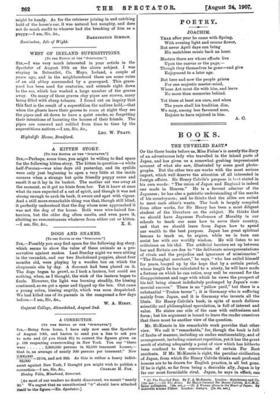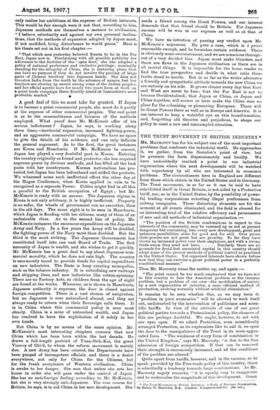BOOKS.
THE UNVEILED EAST.* OF the three books before us, Miss Fisher's is merely the diary of an adventurous lady who travelled in the inland parts of Japan, and has given us a somewhat gushing impressionist account of what she saw, illustrated by some good photo- graphs. But the other two are works with the most serious import, which well deserve the attention of all interested in foreign affairs. Sir Henry Colvile's purpose is best stated in his own words : " The union of Japan and England is indeed one made in Heaven." He is a fervent admirer of the Japanese ; be has also a patriotic understanding of the merits of his countrymen; and he thinks that the allies are suited to meet each other's wants. The book is largely compiled from other works, for Sir Henry has been a most diligent student of the literature on the subject. He thinks that we should have Japanese Professors of Morality in our schools to teach our sons how to serve their country, and that we should learn from Japan how to spend our wealth to the best purpose. Japan has great spiritual lessons to teach us, he argues, while we in turn can assist her with our worldly wisdom. He will listen to no criticisms on his idol. The artificial barriers set up between her and Britain are due to "the deliberate misrepresentations of rivals and the prejudice and ignorance of missionaries." " The Shanghai merchant," be says, " who has exiled himself for years, buoyed up by the hope that by a certain period, whose length be has calculated to a nicety, he will have made a fortune on which he can retire, may well be excused for the disappointment and rage with which be views the prospect of his toil being almost indefinitely prolonged by Japan's com- mercial success." There is no "yellow peril," but there is a substantial " Teuton terror "; it is Germany who is suffering mainly from Japan, and it is Germany who invents all the libels. Sir Henry Colvile's book, in spite of much dubious scientific and philosophical speculation, is full of interest and value. He states one side of the case with enthusiasm and force ; but his argument is bound to leave the reader conscious that there must be another view of the question.
Mr. McKenzie in his remarkable work provides that other view. We call it "remarkable," for, though the book is full of faults of manner, including an undue sentimentality, and of arrangement, including constant repetition, yet it has the great merit of stating adequately a point of view which has hitherto been confined to the conversation of certain Far East residents. If Mr. McKenzie is right, the peculiar civilisation of Japan, from which Sir Henry Colvile thinks such profound lessons are to be drawn for English practice, is all but gone. If he is right, so far from being a desirable ally, Japan is by far our most formidable rival. Japan, he says in effect, can
• (I) The Unveiled Bast. By F. A. McKenzie. London : Hutchinson and Co. [12s. ziet.1—(2) The Allies. By Major-General Sir Henry Colvile, K.C.M.G. Same publishers. pls. net.)—(3) d Woman Alone in the Heart of Japan. By Gertrude Adams Fisher. London: Sisley's. [7s. dd. net.] only realise her ambitions at the expense of British interests. This would be fair enough were it not that, according to him,
Japanese methods are themselves a menace to civilisation. "I believe, reluctantly and against my own personal inclina- tions, that the methods of expansion adopted by Japan must, if not modified, bring disturbance to world peace." Here is his thesis set out in his first chapter :—
" That which men yesterday believed Russia to be in the Far East, Japan now is. Proclaiming with all possible publicity her adherence to the doctrine of the ' open door,' she has adopted a policy of national preference and exclusive privilege; nominally standing for the integrity of China, she is maturing plans that can have no purpose if they do not involve the passing of large parts of Chinese territory into Japanese hands. She does not threaten India from the north by the advance of armies, but her teachers are stirring up unrest among some of the Indian peoples, and her official agents have for nearly two years been at work on a great trade campaign there directly aimed at Lancashire's most
profitable market." •
A good deal of this we must take for granted. If Japan is to become a great commercial people, she must do it partly at the expense of other commercial peoples. The real point is as to the reasonableness and fairness of the methods employed. What proof does Mr. McKenzie offer of his serious indictment ? Japan, he says, is working along three lines,—territorial expansion, increased fighting-power, and an aggressive commercial campaign. We have no space to give the details of his evidence, and can only indicate the general argument. As to the first, the great instances are Korea and Manchuria. If Mr. McKenzie be correct, Japan has played a very doubtful part in Korea. Entering the country originally as friend and protector, she has acquired supreme power by devious methods, and has filled all the best posts with her countrymen. Korean nationalism has pro- tested, but Japan has been beforehand and stifled the protests. We witnessed some such ineffectual effort the other day at the Hague Conference, when Korea applied in vain to be recognised as a separate Power. Critics might find in all this a parallel to the British occupation of Egypt ; but Mr. McKenzie is ready with an answer. The Japanese regime in Korea is not only arbitrary, it is highly inefficient. Property is no safer, the wheels of government run no smoother, than in the old days. The same sight is to be seen in Manchuria, which Japan is flooding with her citizens, many of them of an undesirable class. As to the second line of policy, Mr. McKenzie instances the enormous expenditure on the Japanese Army and Navy. In a few years the Army will be doubled, the fighting-power of the Navy more than doubled. But the third is the most striking. The Japanese Government has constituted itself into one vast Board of Trade. The first necessity of Japan is wealth, and she wishes to get it quickly. Mr. McKenzie has a great deal to say about Japanese com- mercial morality, which he does not rate high. The country is enormously taxed to provide funds for capital expenditure on new industries. The State is busy creating monopolies, such as the tobacco industry. It is subsidising new railways and shipping lines, and new industries like cotton-spinning. There are no Factory Acts, so children from the age of eight are found at the works. Wherever, as is shown in Manchuria, Japanese authority is supreme, the door is closed against foreign competition. There is a vast stream of emigration, but no Japanese is ever naturalised abroad, and they are always ready to return when their Sovereign calls them. It is in China where this commercial policy is seen most clearly. China is a mine of untouched wealth, and Japan has resolved to have the exploitation of it solely in her own hands.
But China is by no means of the same opinion. Mr. McKenzie's moat interesting chapters concern that new
China which has been born within the last decade. He draws a full-length portrait of Yuan-Shih-Kai, the great Viceroy of Chi-li, to whom the reform movement is mainly due. A new Army has been created, the Departments have been purged of incompetent officials, and there is a desire
everywhere, not only for China for the Chinese, but for the frank acceptance of Western civilisation. China is awake to her danger. She sees that unless she sets her house in order she will pass under the control of Japan. She has no anti-foreign feeling, according to Mr. McKenzie, but she is very strongly anti-Japanese. The wise course for Britain, he says, is to aid China in her new development. She needs a friend among the Great Powers, and our interest demands that that friend should be Britain. For Japanese success will be won at our expense as well as at that of China.
We have no intention of passing any verdict upon Mr. McKenzie's argument. He puts a case, which is a priori reasonable enough, and he furnishes certain evidence. There is obviously some overstatement, and we are conscious through- out of a very decided bias. Japan must make blunders, and there are flaws in the Japanese civilisation as there are in all mortal things. It is impossible for the home reader to find the true perspective and decide in what ratio these faults stand to merits. But in so far as the writer advocates a friendly and sympathetic attitude towards the new China we are entirely on his side. It grows clearer every day that East and West are never to fuse; that the Far East is not to become Occidentalised ; that Japan or China, or Japan and China together, will sooner or later make the China seas no place for the colonising or pioneering European. There will be Great Powers there as well as in Europe and America. It is our interest to keep a watchful eye on this transformation, and, forgetting old theories and prejudices, to shape our policy to meet a new and unexampled situation.



































 Previous page
Previous page